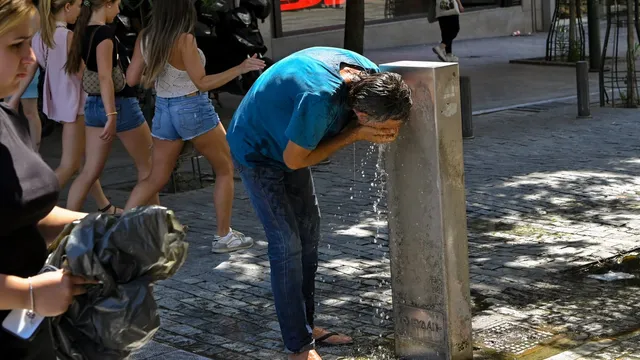
Greece battles severe wildfires amid extreme heatwave conditions
2025-06-30 12:57- Greece is experiencing a major heatwave causing temperatures to exceed 40 degrees Celsius, triggering wildfires.
- Firefighters and emergency services are actively combating the wildfires while evacuating affected residents.
- The ongoing heatwave in Southern Europe raises significant public health concerns and reflects the growing impacts of climate change.
Express your sentiment!
Insights
In Greece, severe wildfires broke out south of Athens as temperatures soared above 40 degrees Celsius due to an intense heatwave affecting multiple European countries. This extreme weather event led authorities to issue evacuation orders and close parts of the coastal road to ensure public safety. In response to the wildfires, around 130 firefighters, alongside planes and helicopters, were deployed to combat the flames that spread rapidly due to strong winds and low humidity, while roughly 40 individuals had to be evacuated from dangerous areas. Local and international tourists sought shelter amidst the sweltering conditions, leading to increased demand for services related to hydration and cooling. As the heatwave persisted, neighboring countries such as Spain, Portugal, and Italy also faced extreme weather challenges with temperatures exceeding 40 degrees Celsius. Portugal issued high alerts for wildfires, while Spain saw numerous individuals trying to stay cool in scorching urban centers. Reports highlighted that two-thirds of Portugal were on alert for extreme heat during this weekend, with predictions warning of temperatures rising as high as 42 degrees Celsius in Lisbon. Similarly, severe weather conditions made outdoor activities risky in Italy, prompting authorities to consider halting outdoor work during peak temperatures. Expert analyses suggested that these rising temperatures could lead to fatalities, especially among vulnerable populations such as the elderly and infants. Cities across Southern Europe like Rome, Paris, and Madrid faced unprecedented high temperatures, with local governments advising residents and tourists to stay indoors during the hottest parts of the day and remain sufficiently hydrated. Many tackled the challenges of extreme heat by finding shelter in shaded spots and utilizing public fountains. Street vendors in popular tourist districts profited from selling cold beverages while those inside homes utilized air conditioning to combat the heat. Experts linked the increased frequency and intensity of heatwaves in Europe to climate change, warning that these climatic events are likely to become common in the region. With rising concerns, public health authorities prepared for increased incidents of heat-related complications, urging preventative measures and preparedness against the ongoing extreme heat. The heatwave's impacts were particularly striking during a time when countries traditionally enjoy tourism, prompting calls for immediate action to adapt to the changing climate and its significant implications on human health and everyday life.